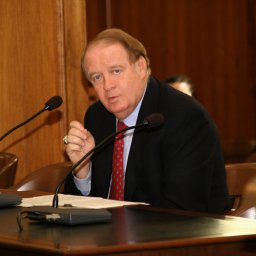TRENTON – The Senate Education Committee today approved a bill sponsored by Senate President Richard J. Codey (D-Essex) and Senator Shirley K. Turner (D-Mercer) that would provide a decisive end to the controversial practice of school administrators and teachers using so-called “diploma mills” to obtain an advanced degree when the institution is not recognized by an official accreditation agency. The vote came after a lengthy hearing in which Sen. Codey railed against the practice as nothing short of fraud.
“Just think, someone who gets one of these diplomas, gets reimbursed for their tuition, gets annual bonuses, and sees their pension increase, and yet, they essentially did nothing to earn it,” said Sen. Codey. “Isn’t it sad that someone would call themselves a doctor and get a pay raise for a diploma that isn’t worth the paper it’s written on? The bottom line is that this practice will erode the quality of education offered in New Jersey unless we act now.”
“These phony doctors are ripping off taxpayers and being horrible role models for children,” said Sen. Turner, Chair of the Senate Education Committee. “It’s nothing less than educational malpractice.”
Bill S2127, unanimously approved by the committee, would prohibit school district employees from using degrees from unaccredited online colleges and universities, or diploma mills, in order to obtain pay raises and tuition reimbursement. The Codey/Turner legislation would require that school district employees only receive tuition reimbursement or additional salary compensation if the institution they attended is duly accredited.
Additionally, employees would have to obtain approval from the superintendent prior to enrollment. Superintendents seeking enrollment would be required to first obtain approval from the Board of Education.
Under the proposed legislation, only those courses that are related to an employee’s current or future job responsibilities would be eligible for tuition reimbursement or additional compensation. If an employee leaves the school district within one year of receiving a tuition payment, the employee would have to reimburse the district in full. Furthermore, employees must maintain a 3.0 grade point average or higher to be eligible for tuition reimbursement.
“When our teachers and administrators receive advanced degrees from accredited universities, our students are the ones who benefit from this increased education and insight,” added Sen. Codey. “What we don’t need is a ‘do as I say, not as I do’ policy that the taxpayers are being forced to fund. Moving forward, we need to make sure these unaccredited degrees are not allowable in any way shape or form.”
The practice came to light over the summer when a number of school administrators, including those from Freehold, Asbury Park and Weehawken, were discovered to have received yearly bonuses and tuition reimbursement for degrees that required little more than submitting a resume or doing a two to three page paper. One of the diploma mills in question that had been used by Freehold administrators – Breyer State University – has even been kicked out of two states and the country of Liberia.
The bill now heads to the full Senate for a vote.
# # #




